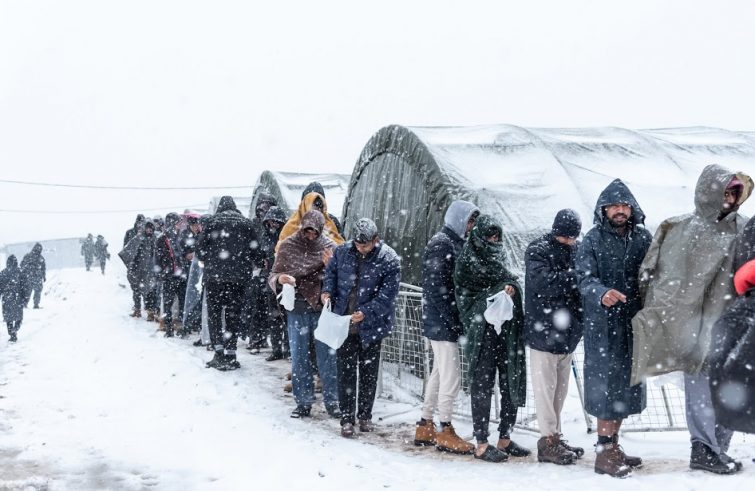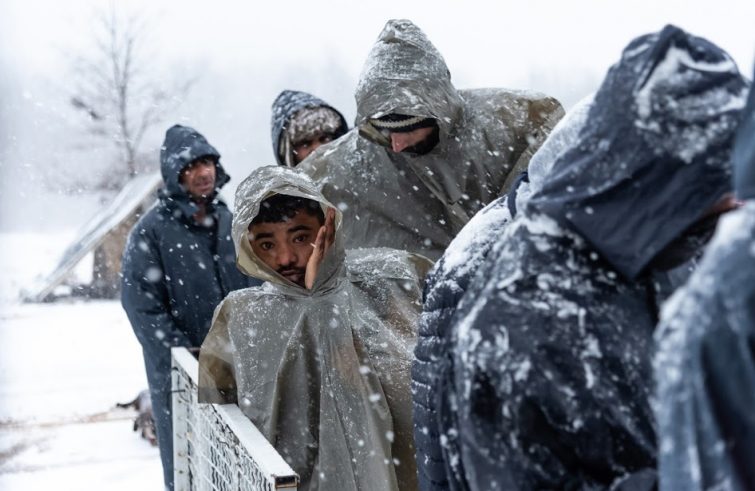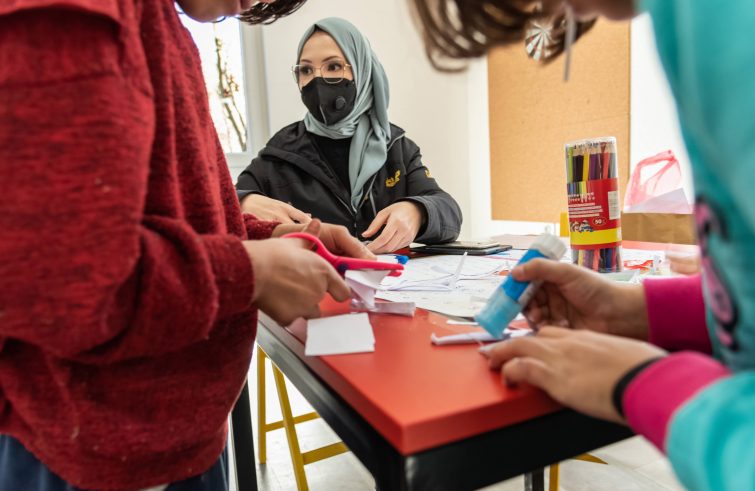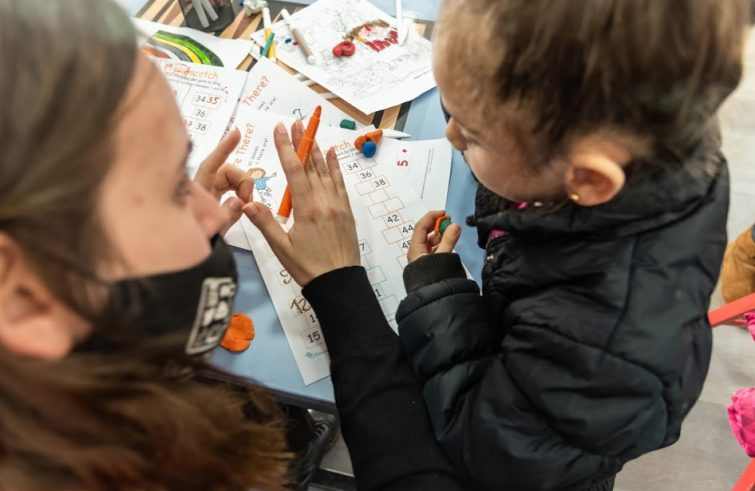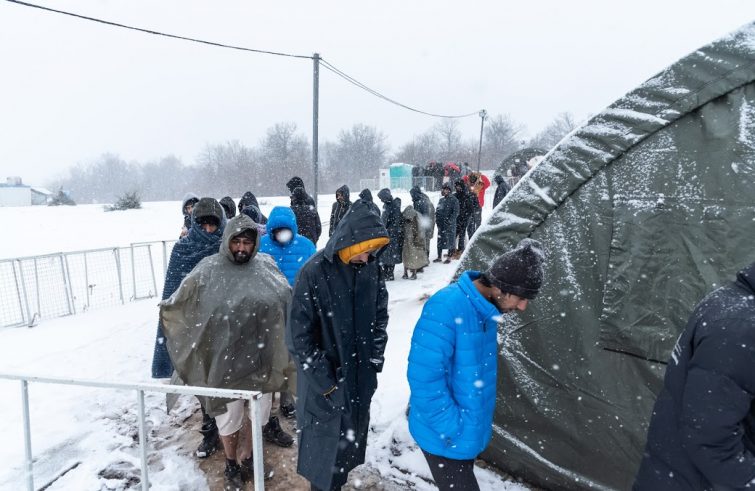
The 900 refugees in the Lipa camp, in Bosnia and Herzegovina, will soon be provided with a heated tent-refectory where the migrants can have their meals and protect themselves from extreme cold weather forecast for the Balkans, with temperature swings dropping to minus 10. The initiative is funded by Caritas Italy and Caritas Ambrosiana, in cooperation with IPSIA-ACLI, the implementing local NGO. Project manager Silvia Maraone, from Milan, has been there for a year working with IPSIA-ACLI, travelling back and forth from the nearby town of Bihac to the Lipa camp in the mountains, some 30 km of unpaved road to be redeveloped by the Bosnian government. The Caritas-IPSIA project is progressing with the help of funds collected for the Balkan route, in the framework of a campaign primarily intended for Catholic communities.
- foto: archivio IPSIA-ACLI
- foto archivio IPSIA
 Works have just been completed in Lipa to level the ground and spread gravel on the site. “We are in the process of installing the tensile structures for the refectory, designed to house at least 600 people,” Maraone told SIR. “A utility tent, a scabies isolation tent and a mosque tent will also be installed. We hope to finish by the end of the week. Meals will be brought and distributed by the Red Cross of Bihac, which is already providing this service twice a day. Bread and canned food for now.
Works have just been completed in Lipa to level the ground and spread gravel on the site. “We are in the process of installing the tensile structures for the refectory, designed to house at least 600 people,” Maraone told SIR. “A utility tent, a scabies isolation tent and a mosque tent will also be installed. We hope to finish by the end of the week. Meals will be brought and distributed by the Red Cross of Bihac, which is already providing this service twice a day. Bread and canned food for now.
- foto archivio IPSIA
Social cafés with families and children. Six IPSIA-ACLI humanitarian workers and four volunteers have been working for years in Bosnia offering “social cafés”, i.e. animation and recreation centres for families and children in the camps, including another 6,000 that are now travelling along the Balkan route. Activities for children offered in these centres, in addition to coffee and warm tea, include card games, tournaments, language courses and sports. The Usivak facility in Sarajevo, for example, was set up thanks to a 50,000 Euro donation from the Office of Papal Charities, at the behest of Pope Francis. However, the Lipa camp is now faced by a new emergency, in the wake of last December’s fire and the need to rebuild it to ensure adequate shelter for the refugees. As soon as the construction of the refectory is completed, a “social café” should also be opened in Lipa with psychological and social activities. “I hope to bring equipment for an outdoor gym. It could be a way for the children to do some physical activity and fill up the time,” Silvia said.
- foto archivio IPSIA
Waiting to “play the game.” The outrageous circumstances faced by people trying to reach Europe via the Balkan route, attempting to “play the game”, i.e. trying to cross the Croatian border amidst violence and police repression, is finally under the media spotlight.
Pope Francis drew attention to their plight during the Angelus of February 7th,
stressing the need to protect minors in particular. Migrants are freezing in heavy snow at Lipa camp, lacking heating and electricity, without water and showers owing to frozen pipes, with one restroom for every hundred people and insufficient food. They are out of sight of the local population unwilling to accept them on their territory, nor do they engage in voluntary work. “What the eye doesn’t see, the heart doesn’t grieve over”, the humanitarian worker remarked. Afghans, Syrians, Pakistanis, Bengalis and Iranians spend their days doing nothing, crammed into 30-person tents on bunk beds, wrapped in blankets to protect themselves from the cold, creating a sort of ‘stable effect.’ Their blankets will have to be burnt to prevent the spread of scabies, given the precarious hygienic conditions. Here COVID-19 is the least of the problems.
Great resilience. The resilience of these young people, many of whom have been on the move for years, facing countless hardships and dangers, is incredible. “They manage to keep calm in spite of everything,” said Silvia, “they don’t complain about the cold, only occasionally about the lack of food. They never move from Lipa, not even to go to Bihac, also because they would have to walk a 30-km impracticable road. They spend their days there, hoping the bad weather will stop, and eventually attempting ‘to play the game’ again in spring. Some have even been rejected 20 or 23 times. Others manage to make it through, those who fail return to the camp.”
“The worst thing is having to witness the violence inflicted on children at the border. Minors with their arms broken, whipped on their backs”.
In contrast, the best moments “are when we receive news from those who succeeded to reach their destination, in France or Germany. Knowing that their lives are not wasted, that they regained their dignity, means a lot to us. It’s beautiful also when we laugh and joke together. For a few hours we can forget where we are.”
Nothing has changed over the years. Those suffering some form of psychological distress, often resulting from the difficulties of the journey, remain in the camps for years. Only few of them benefit from voluntary return programmes offered by international organisations – IOM and UNHCR – which will remain in Lipa as donors for back office and capacity building activities. The Bosnian government has already decided to transform the camp into an official transit and reception centre, thanks to EU funds, and will provide essential infrastructure. As spring is imminent, the Balkan route will probably be discussed again next winter. “I would like the problem to be tackled not only in terms of emergency but also at a political level and in a serious manner,” Silvia Maraone said. Unfortunately, nothing has changed after years of discussions.

